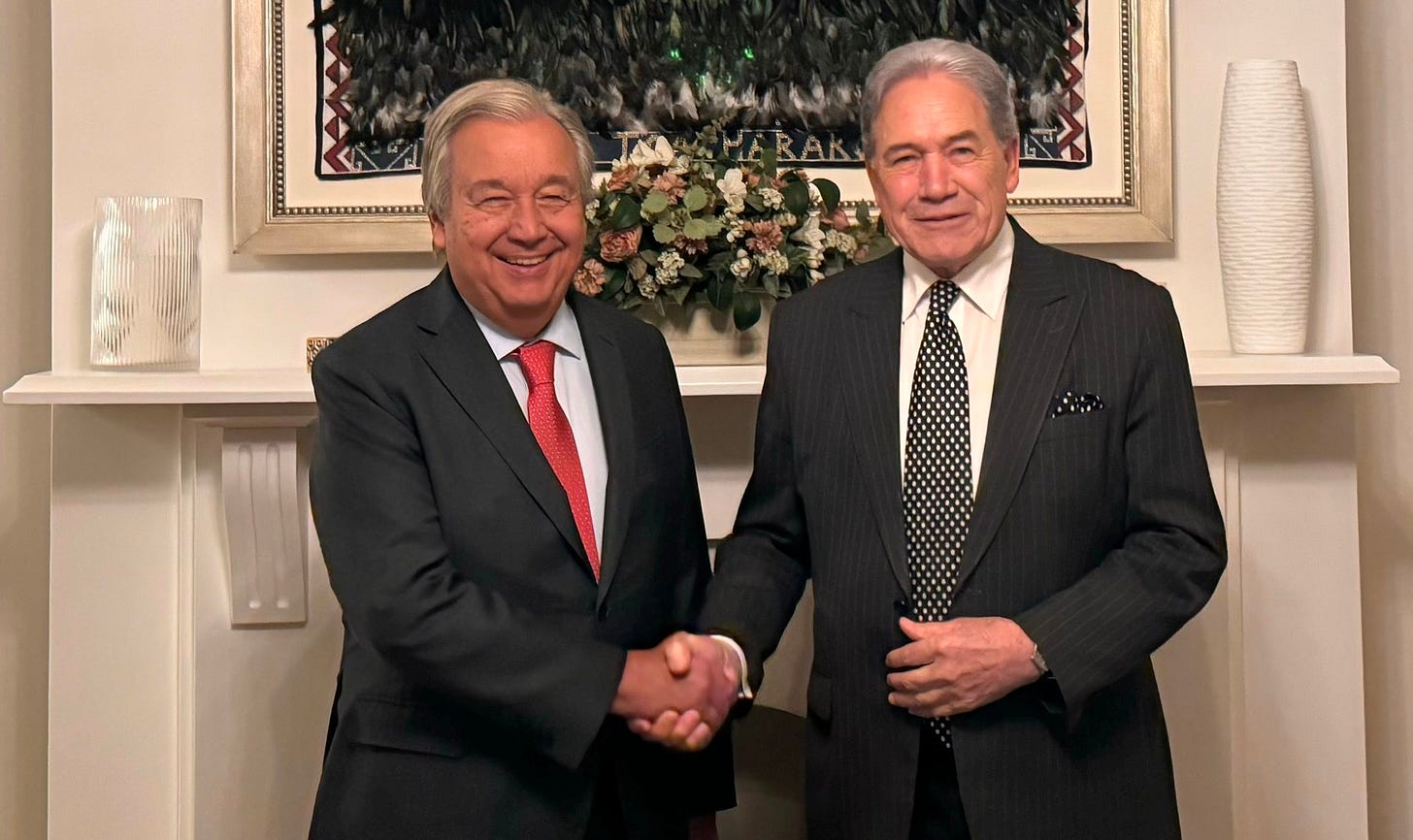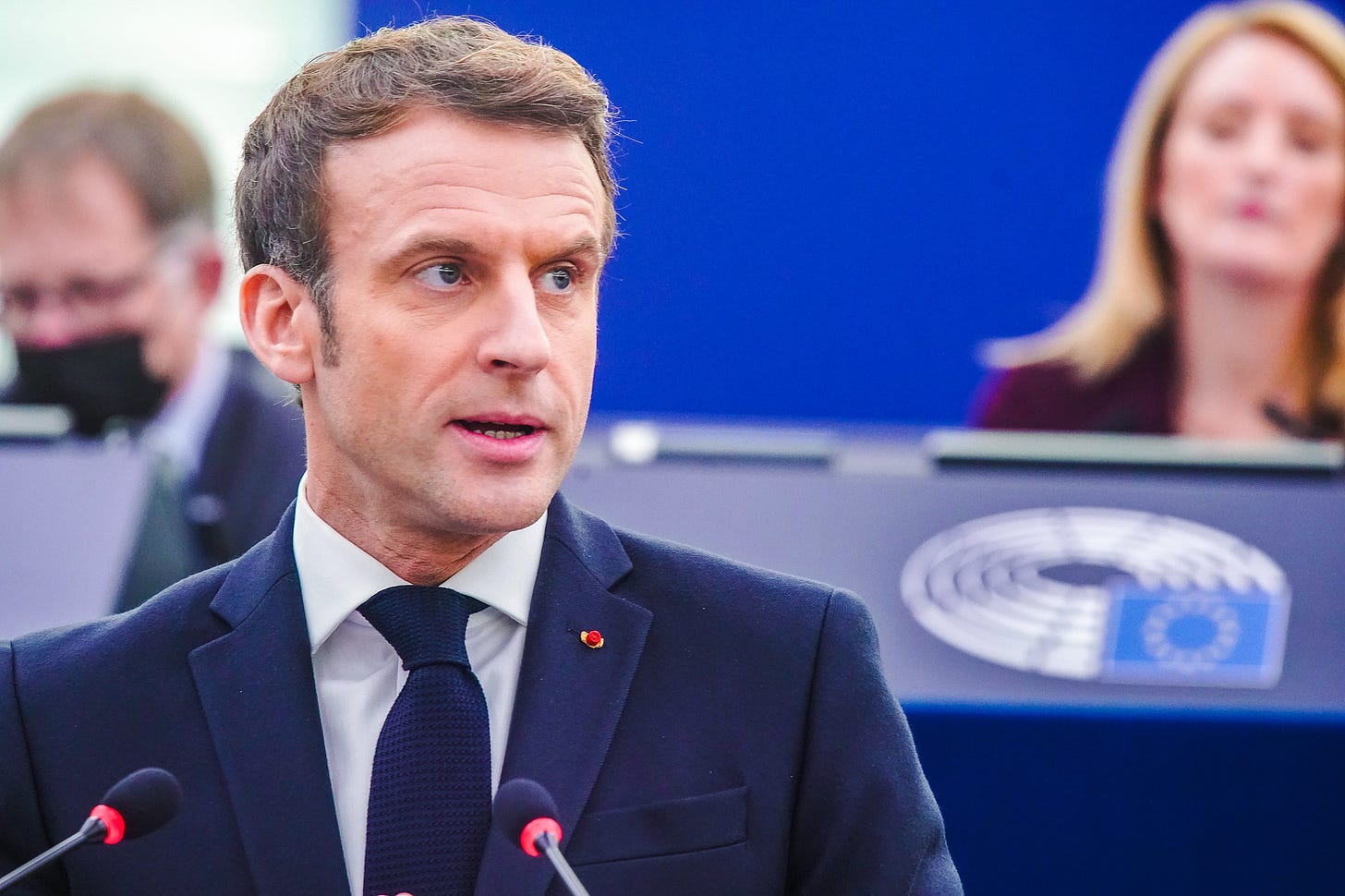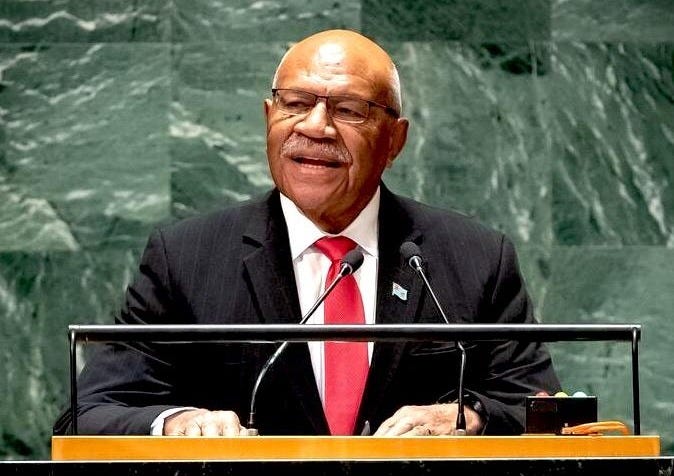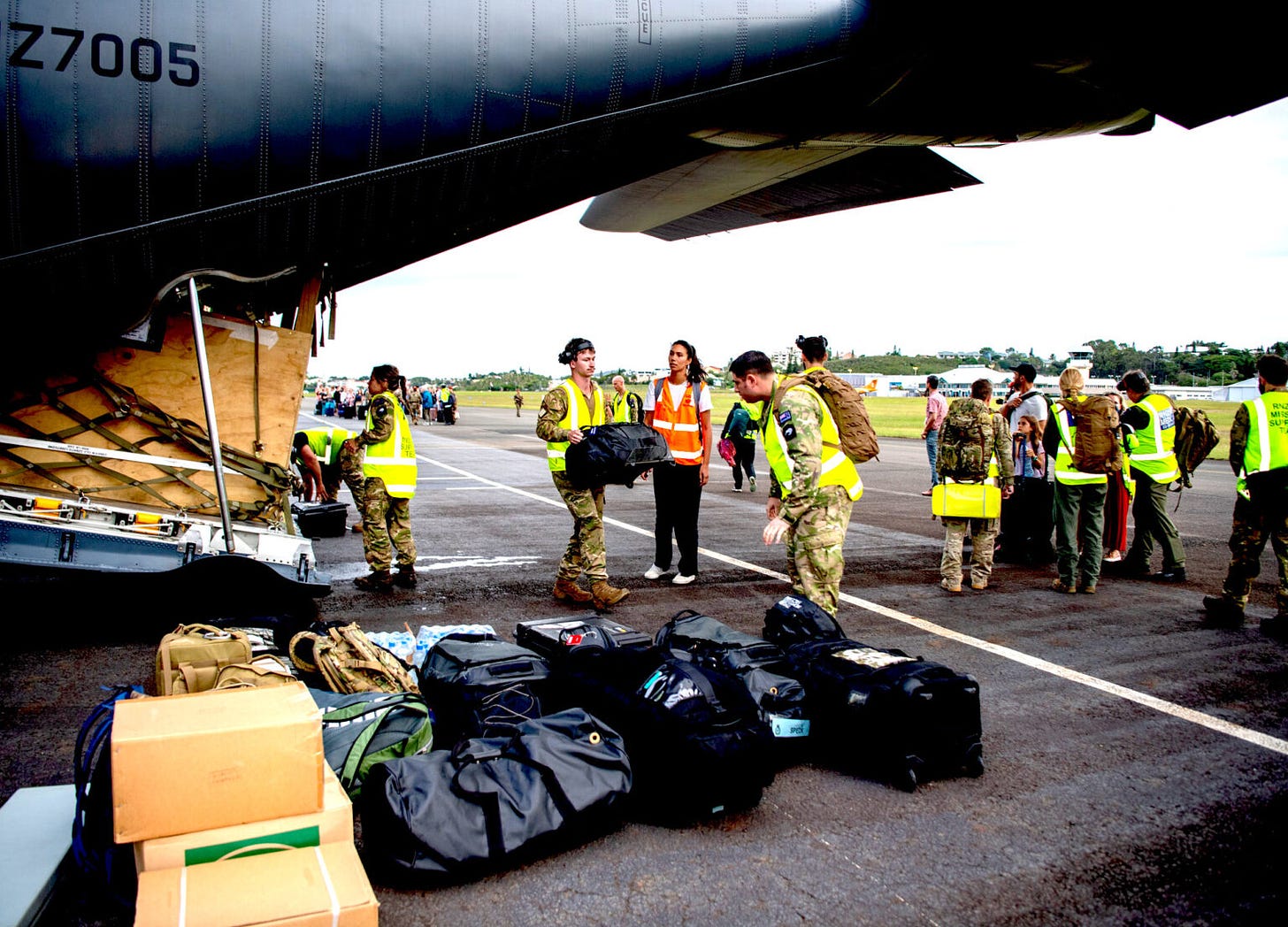Pacific leaders meet amid efforts to securitise region's political architecture
As Pacific Island Forum leaders meet, a Defence document shows NZ pushing for the consensus body to be married to a Western-dominated regional defence structure.

A version of this story was first published by Consortium News
Leaders from across the Pacific converge this week for much-anticipated talks amid increasing efforts to keep their countries outside of China’s orbit and enmeshed instead in Western military architecture.
The 53rd annual Pacific Islands Forum (PIF), being held in Tonga from August 26-30, will include talks on the impact of climate change, the continued crisis in French colony New Caledonia and great power competition in the region.
A New Zealand Defence Ministry briefing document obtained under the Official Information Act (OIA) reveals PIF member New Zealand has been pushing for the PIF to be structurally linked to the Western-aligned South Pacific Defence Ministers’ Meeting (SPDMM).
It remains unclear to what extent the issue will feature highly in discussions at the PIF summit this week.
The SPDMM brings together regional Defence Ministers on military cooperation issues in the South Pacific and is broadly focused on maintaining US hegemony, as well as pursuing military interoperability.
Last year’s SPDMM summit, hosted by France in New Caledonia, was attended by senior civilian and military officials from Australia, France, New Zealand, Papua New Guinea and Tonga, as well as observers from Japan, the UK and the US.
Briefing papers for Defence Minister Judith Collins revealed her mission during a discussion with Tonga at the Summit was to “convey New Zealand’s position that there should be a link between the SPDMM and the Pacific Islands Forum.”
The heavily redacted document noted that: “The PIF architecture and defence architecture have separate but overlapping countries involved. This reflects that defence responsibilities in the region do not align with political representation… Linking the PIF architecture and the SPDMM is likely to enhance security discussion across both organisations.”
There is now concern that a parallel or overarching securitised regional architecture is being created.
Thinktanks, politicians warn over Chinese influence
Ahead of the PIF summit, attended by the 18 leaders of strategically important islands and archipelagos spread across the vast Pacific Ocean, thinktank analysts and politicians from sub-imperial nations sounded alarm over supposed dangers of malign Chinese influence in the region.
Many Pacific nations have close trade and development ties with China and some, like the Solomon Islands, have signed security agreements. The issue will likely be given a key focus at the Forum, the region’s top political consensus body established to enhance trade cooperation, peacekeeping and a shared vision of good governance.
New Zealand Foreign Minister Winston Peters in particular will be keen to discourage its members from pursuing relationships with China, his own country’s biggest trading partner. He attended the PIF opening ceremony. Prime Minister Chris Luxon flew out on Tuesday to attend a leader’s summit on nearby island Vava’u.
Peters told Associated Press (AP) on August 23 that the US and its allies, including New Zealand and Australia, had failed to engage enough in the region, leaving a power vacuum for others to fill, meaning China.
Prior to the summit he had visited 14 Pacific countries this year. The country is increasingly exercising sub-imperial power in the region, while offering an olive branch to other members of the “Pacific family”, trading on its image as an honest broker with an anti-nuclear constitution and an independent foreign policy.
That image is unravelling fast with its increasing alignment with US-led military architecture and Australian defence posture, as articulated by Prime Minister Chris Luxon at a speech to the Lowy Institute in Australia this month.
New Caledonia as a colonial bulwark against China
A definite focus will be put on French colony New Caledonia at the summit this week. A dozen people have been killed in clashes between Kanaks and French security forces since May. Protests erupted after a vote in the French National Assembly on May 13, passing a constitutional amendment to increase the number of French ex-pats eligible to vote in the island’s elections, hence diminishing decolonisation provisions of the Nouméa Accord.
The 1998 peace agreement promised independence for Kanaks if a majority voted for it via a referendum. French President Emmanuel Macron suspended the proposed law in June, but UN experts have demanded its complete repeal.

The PIF leadership was scheduled to visit the archipelago on a fact-finding mission amid a crisis made worse after France arrested and deported independence figures to prisons in France as an increasingly militarised presence takes hold. France now has thousands of troops and police stationed across its dependency.
The PIF mission was postponed over what it said were "issues regarding due process and protocol that will need to be addressed”. Macron had said the mission needed to be within certain “guiding principles” of addressing issues like social and economic stability.
Fears have been expressed publicly about where New Caledonia would sit geopolitically if it gained its independence.
Anti-China scholar Anne-Marie Brady, writing for Western defence-aligned thinktank the Australian Strategic Policy Institute (ASPI) this month, effectively argued for the merits of colonialism as a bulwark against Chinese influence.
She said if New Caledonia were to become independent without France’s continued financial and security support it would “weaken regional security in the Pacific”. She said independence coalition Front de libération nationale kanak et socialiste (FLNKS) would align closer with China.
“French military assets are one of the factors standing in the way of China changing the power balance in the Indo-Pacific, and in the South Pacific more specifically,” Brady said.
“France and the US are the only actors in the region with networks of military bases worldwide, and with global military communications networks based on sovereign territory.
“If France were to lose any of its Pacific territories, and access to the vast maritime area they provide, its global influence and status would decline significantly. That situation would suit the interests of China and Russia. France’s Pacific territories of New Caledonia and French Polynesia provide a major logistics base for NATO military assets and the European Space Agency.”
Brady added New Caledonia was now dependent on the Chinese market for its exports, which posed as a “strategic risk”. “The territory needs to rebalance its economy and return to a more diversified portfolio of markets,” she said.
Former US State Department security advisor and geopolitical analyst Van Jackson told In Context such Western interventionist attitudes were stopping the Pacific region from remaining stable, or a zone of peace, a phrase spun by Fiji’s Prime Minister Sitiveni Rabuka at last year’s PIF summit.
He argues Western talk of maintaining a “free and open Indo-Pacific” is rhetoric masking the true nature of relationships in the region.
“The existence of a non-sovereign Pacific - approximately a third of the region lacks sovereignty in some way - is actually the region's primary source of insecurity,” Jackson said.
“Outside powers want the Pacific to serve as a geopolitical buffer, but they think the only way to do that is by exercising exclusionary control themselves. It's that dynamic that's leading to a carve-up of the Pacific.
“But if the Pacific were truly independent, cohesive, and self-determining then the region could credibly be a buffer that limits impositions by outside powers. Colonialism is what is currently standing in the way of great-power stability.”
Western political messaging and news media narratives have cast China’s “increasing assertiveness” as a challenge to the “geostrategic balance” in the region that must be checked.
The BRICS country has invested heavily in the Pacific, with its pragmatic global infrastructure development strategy, the Belt and Road Initiative, also extending into the region.
Australian thinktank the Lowy Institute released a report ahead of the summit pointing to China becoming a major player in development aid, including ports, finance, airports and telecommunications and that it had sought a greater role in the military, policing, digital infrastructure and media.
It warned the 18 Pacific Island Forum members faced challenges of compromised good governance and transparency amid "unbridled strategic rivalry" between the US, its Western allies and China for influence.
"Faced with this new 'great game', Pacific countries have become diplomatic price-setters and are leveraging increased competition to maximise development benefits,” the report said.

China hosted leaders of the Solomon Islands, Vanuatu and Fiji ahead of the PIF summit. The visit of Fiji's Rabuka, who met Chinese President Xi Jinping in Beijing last week, came after Google announced it would build a $US200 million data centre in the country to support a new subsea cable.
Overshadowing aid assistance and investment is a battle over who has access to their strategic locations, with rival nations seeking to monitor and control naval movements across the Pacific Ocean.
The report pointed out even seemingly benign and altruistic offers to mobilising naval and air assets for disaster response involves securing rights to use ports, airstrips, and maritime routes around Pacific Islands, so US allies and China are keen to offer assistance.
The FRANZ arrangement between France, Australia and New Zealand, signed in December 1992, allows the nations to coordinate disaster reconnaissance and relief assistance in the Pacific when requested by partner countries.
Meanwhile, the US, Australia, New Zealand and France, through the Pacific Quadrilateral Defense Coordinating Group (P-QUAD) patrols and carries out surveillance in the western and central Pacific Ocean to “enhance maritime security” with the assistance of Pacific Island nations, through bodies such as the Fisheries Forum Agency.
The US and its allies have long wanted to turn the region’s nations into sentinel states, joining the likes of Japan and the Philippines in encircling China with military assets as the increasingly belligerent hegemon seeks to contain a growing challenge to its imperial rules-based international order.
A New York Times story reported last week that the US has reorientated its classified nuclear deterrence strategy to focus on a threat from China, increasing tensions further.
Decolonisation key to avoiding use as pawns - Naouna
Jimmy Naouna, a leading figure in the pro-independence alliance of political parties, Front de libération nationale kanak et socialiste (FLNKS), said decolonisation would make it much harder for great powers to use his country as a pawn in the great power game now underway.
“That’s why we in FLNKS are calling for our independence, so that we are able to manage our own affairs, both at national and international level,” he told In Context.
“Taking into account this Indo-Pacific strategy that France is pushing ahead with in the region, they are basically using New Caledonia and French territories as its forward posting in the region.
“We believe that when we are able to manage our affairs we will be able to also manage geopolitical competition in the region and be able to align ourselves according to our national interests.
“But the fact that we are not fully sovereign means we don’t have that capacity. It’s very important for us that we're able to play a leading role in negotiations. We don't want to be used by the players in this political game between the two major powers, China and the US.”
Central to New Caledonia gaining independence is securing and winning a fourth referendum, an outcome French electoral ‘reforms’ endanger.

Macron showed his partiality towards French loyalism in the country when he declared a third referendum in 2021 legitimate after independence groups boycotted the vote because it was being held in the middle of the Covid-19 pandemic. That vote delivered a mere 3.5 percent backing for independence, down drastically from a 46.7 percent pro-independence vote in 2020.
The PIF has acknowledged the referendum failed to meet UN principles, having had observers at that vote, although countries like Australia have not publicly stated it was illegitimate.
“I don't think France will go back and say that that referendum was not legitimate,” Naouna said. “But what we're going forward with now is a plan to negotiate a new referendum on self-determination that will overcome this issue of a defective referendum.”
France’s apparent decision to restrict the PIF’s fact-finding mission to New Caledonia ahead of its summit this week, leading to its postponement, has in effect stifled the possibility of meaningful statements coming out of the leaders’ engagements. Without being adequately briefed on the situation, a further planned high-profile visit of PIF leaders to the country to add impetus and direction to peace talks has been made difficult.
Instead, Western security architecture in the region is likely to have a significant bearing on any resolution of New Caledonia’s crisis of sovereignty, ultimately responsible for the current bout of instability and violence.
The next SPDMM summit is due to take place in October hosted by New Zealand, with New Caledonia also a key focus. With that military grouping set on maintaining the colonial dynamics of the region as a means of maintaining the geopolitical status quo, prospects for an immediate just settlement in the country may be low.




The Realm of New Zealand has returned to its roots as a colonial and sub-imperial power, adopting an aggressive attitude towards its own indigenous population, supporting French imperialism in Kanaky (though it is yet to go as far as offering the military support it gave to French colonialist forces in IndoChina) and attempting to bully the island states of the South Pacific into accepting the rule of the collective western powers headed by the United States of America. No longer even pretending to follow an "independent foreign policy" the regime now boasts that it is "in lock step" with its bevy of Five Eyes overlords. Meanwhile New Zealand academics in the pay of the NATO military alliance, such as Professor Anne-Marie Brady fiercely argue for the maintenance of French colonial rule in Kanaky through force, and the total subjection of New Zealand's national interest to those of the US within the Pacific region. This policy is as disgraceful as it is stupid and it can only end in humiliation for the regime.
So China haven't been involved in a war for 45years not so the Americans I know who I'd rather have in the Pacific.